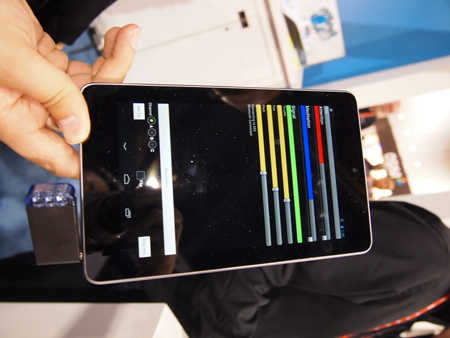Control the Puzzlebox Orbit Helicopter With Your Mind
Use your brainwaves, not a remote control or app, to fly this bad boy.
First launched on Kickstarter back in November 2012, the Puzzlebox Orbit brain-controlled helicopter is creating quite the buzz at this year's Consumer Electronics Show, drawing throngs of people who all want to try levitating the helicopter with their minds.
While the Orbit helicopter requires a mobile device to fly, it doesn't function as a remote control like other app-controlled flying drones. In fact, it is the NeuroSky MindWave Mobile EEG headset (the same one in the Necomimi brain-controlled cat ears) that reads and sends your brainwaves to the smartphone or tablet via Bluetooth, where the app converts your brain activity into flight instructions for the helicopter. Details like the height and direction of the flight are then beamed to the helicopter through the Infrared Blaster, which is plugged into the headphone jack for power.
To get the helicopter into the air, you have to focus on the flying object to the point where it takes off: the harder you concentrate, the higher it flies. If you relax the helicopter will just drop to the ground, so you have to sustain your focus to keep the device in the air. You can change the threshold settings in the app to make it easier to control the helicopter, or increase the difficulty as you get the hang of it.
Technically, the Orbit is compatible with both iOS and Android devices but because the app is still waiting for approval from the iOS App Store, the Puzzlebox reps only demoed the Orbit on Android devices like the Google Nexus 7.
Besides getting the Orbit into stores, Puzzlebox really want to get more developers thinking about different uses of Brain-Computer-Interface so it has already released its source code and hardware schematics to make its technology easy to hack (as promised in its Kickstarter campaign). We can't wait to see what else BCI developers come up with.
Contact Us for News Tips, Corrections and Feedback
Get Tom's Hardware's best news and in-depth reviews, straight to your inbox.
-
ln030921 Try to use my brainwaves and it'll fly in all sorts of menacing directions and ultimately crash and burn.Reply -
basketcase87 Please tell me the app says "Do, or do not. There is no try." when you open it...Reply -
Excerpts from the Blog Discussing Open Source, Open Hardware, and EducationReply
http://atmelcorporation.wordpress.com/2013/01/09/open-sauce/
..... Beyond novelty, however, lies the true purpose of the Puzzlebox Orbit. All source code, hardware designs, schematics, and 3D models are published freely online. Step-by-step guides for hacking the software and electronics are included. Methods for decoding infrared signals and extending mechanisms to operate additional toys and devices are shared. Creative modification is encouraged. The goal is to promote the product as a teaching aid for middle and high school sciences classes and in university-level programming and electrical engineering courses....
Read More > http://atmelcorporation.wordpress.com/2013/01/09/open-sauce/ -
_Cosmin_ But why not use directly bluetooth or wifi for comands ?Reply
IR discharge battery very fast and is affected by so many factors... it is not reliable!

